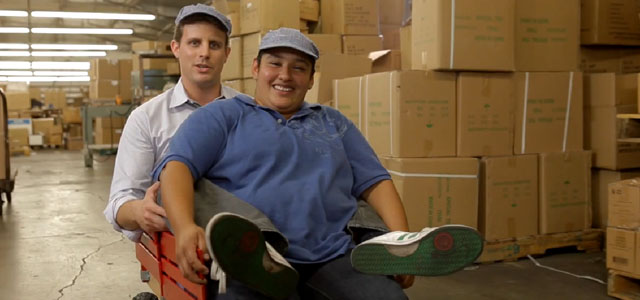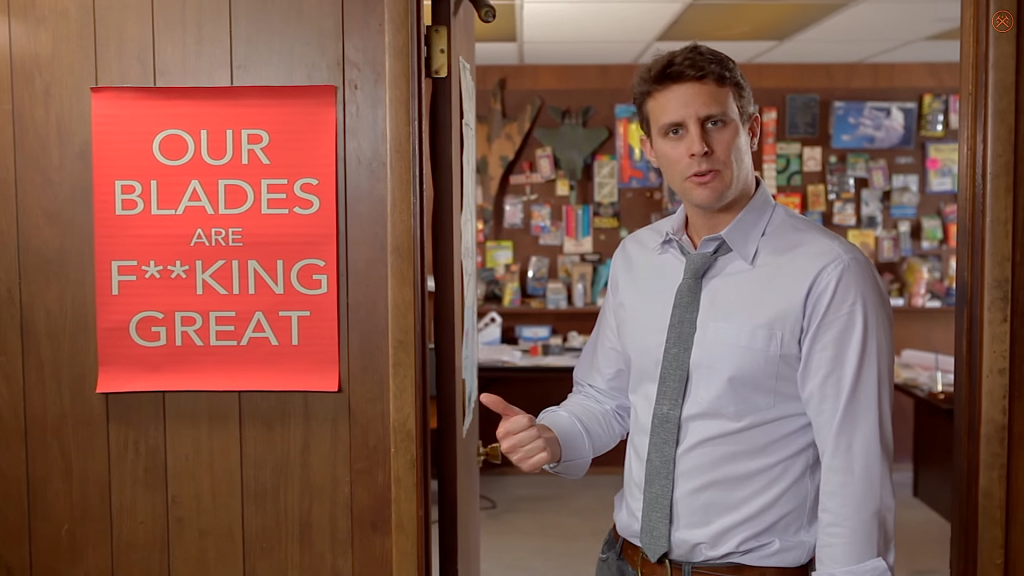Ask any North-American male aged 17-30 whether he’s heard of Dollar Shave Club (DSC).
He’ll probably say, “Yeah.”
And it’s not just dudes who know about DSC. A lot of women know about it too because they’ve bought subscriptions for the men in their lives.
Dollar Shave Club is a classic example of startup that blew up—in a good way.
What was one of the first signs of their success?
A video. A viral video.
If you haven’t seen it, you ought to check it out:
The company’s launch video, casually titled “Our Blades Are F**king Great,” quickly became a sensation on the web.
With punchlines and gags to suit a variety of tastes, the video racked up nearly 5 million views within the first 90 days.
The company’s founder, Michael Dubin, had a few aces up his sleeve to help create a professionally cut video.
The CEO studied performing arts at Upright Citizens Brigade (UCB) in New York, where he learned to use the power of comedy to capture the attention of an audience.
He also leveraged his contacts from his time at UCB to bring on a director and connect with a production studio that helped keep costs low. The original DSC launch video was only $4,500.
Most brands trying to produce a tightly choreographed video like the one DSC produced would expect to spend closer to $60k.
But the viral video wasn’t pure luck. The whole thing was carefully orchestrated. But let’s be honest, most startups aren’t Dollar Shave Club.
You probably don’t have a background in theater to help you be as funny as DSC’s CEO, and it’s not likely that you’ll create something that goes on to secure over 28 million views.
But don’t get caught up on the view count. You can still be successful without trying to chase the same numbers if you break down what DSC did in their quest for a successful launch.
Here are 8 tricks you can pull from their viral campaigns to help you boost your own content strategy.
1. The power of video
Simply put, video is the best format for telling stories. You can connect with a consumer and establish a powerful emotional connection with your audience through the use of video more so than any other content format.
You can flesh out that one concept that resonates with an audience and deliver it with a voice and personality that captivates them through a one-on-one connection.
DSC use of video was a smart move, especially given video usage statistics. HubSpot shares a number of compelling stats that show why diversifying content marketing to include video is a smart move:
- The amount of of online videos watched per person per week has almost doubled since 2018
- 96% of people watch videos to learn about products
- 89% of people are swayed by videos to make a purchase
- 79% of people were convinced by a video to purchase an app or software
- Over 90% of people want to see brands create more videos
2. Great storytelling
We’re convinced that great storytelling is crucial to a brand’s viral success. This happened at DSC.
Here’s the story (about the story) from Adam Weber, Dollar Shave Club’s CMO.
“What we’ve really focused in on since our launch video has been all about finding which new stories to tell, to what consumers, and then finding the right distribution platforms to tell them. We take our video storytelling to the obvious places. We do a lot of investment in television, which is a great place to tell a narrative with video.”
Here’s more of his explanation:
I think in the long term, as you get more into the digital places, the social outlets like YouTube, Facebook, Snapchat, Twitter — those types of venues are great venues for telling stories via video. Those have become an increasingly larger part of our game plan. They offer a lot of unique capabilities that something like television doesn’t offer.
Not every aspect of a marketing strategy needs to contain storytelling, but it should be a part of your marketing strategy, and DSC’s success is proof of that. There are three reasons why it works.

- First, stories grab the attention of the audience. When you have an impressive and captivating narrative, people will want to satisfy their curiosity—especially if the story is relatable.
- Second, having a strong narrative helps build the trust with your audience. People trust you more when you open up and share personal stories with them. It works very similarly when brands share their narratives, and it brings the audience back for more.
- And third, stories simply do a better job at grabbing the attention of most people over raw content like statistics or facts. Not to say those aren’t interesting at all, but you’re guaranteed to capture more interest if you can tell a story around facts and data.
3. They knew their audience
Another thing that stands out with Dollar Shave Club is their knowledge of their target audience. DSC talks to men in a pretty relatable voice, providing something that never existed when it comes to men’s grooming products.
Prior to Dollar Shave Club, a lot of the razor content and brand positioning either used a highbrow “gentlemanly” approach or painted men as hairy Neanderthals who needed blades with the edge of a katana to stay smooth.
But how long can you sell products pushing the “closer shave” approach?
Dollar Shave Club shows that when you take the time to unearth what your audience wants, you learn how to talk to them. You can create content that uses language they can relate to, with ideas that make sense.

Every content marketing strategy should begin with good, deep buyer research so you know what they want, how they want it, where to find them and how to get it to them.
4. Focused on the value proposition
No matter how hilarious the video is, all those views won’t translate into sales and revenue if you can’t connect the product to the consumer in some way. Storytelling is a good start, but so is knowing your audience.
Dollar Shave Club knocked it out of the park by staying focused on the value proposition with their messaging and content, from landing pages to videos.

When you watch the videos, you understand the convenience of never having to shop for replacement blades, and you also appreciate the price. We know, like many men do, the frustration of watching the price of blade replacements climb constantly.
Dollar Shave Club didn’t have a unique product. Razors are everywhere. Still, they developed a unique value proposition around their products and made sure to keep that front and center throughout their content marketing campaigns.
5. Easily sharable
Dollar Shave Club includes traditional media placement, like television, in their marketing strategy. But the success of the launch and rapid growth can be attributed to the shareability of their digital content.
By creating a variety of video content, along with stop-motion animations, promoted through social media, they made it easy for prospective customers and consumers to share that content with their friends and family.

It was, and still is, a perfect formula for getting content to spread. Simply create content that triggers positive emotions.
Awe-inspiring content, humor, and strong stories make any piece of content engaging and shareable.
6. Every word has a purpose
Early in the production process, Dubin had a sizable script that ran upwards of four pages. Part of the creative process meant trimming that down. It’s an approach you have to take with content, no matter the format.
If content isn’t 100% essential to delivering the message, it needs to be cut. Every word, moment, and frame of a video must have a purpose or a point.
Once the content was stripped down to its bare bones, focused only on the brand messaging, the team went to work scripting humorous content to keep the video light-hearted, but sharp-witted and funny.
People understand brand messaging, and when you subvert that, they recognize the risk you took,
says Lucia Aniello who directed the launch video for Dollar Shave Club and worked with Dubin to craft the script.
Learn to trust the funny. If you take a risk, you may get a reward.
A perfect example is the unofficial tagline of the company that acts as the title for the first video. While trying to establish a solid line that would hit the audience hard at the beginning of the video, Aniello suggested “Our blades are f**king great.”

I remember Mike’s face when I first said that line,
Aniello recalls.
There was a half a second of concern, and then whatever angel sitting on his shoulder—or devil maybe—said, “Go for it.”
7. Strategic content release
There are plenty of marketers who will tell you that Dollar Shave Club just got lucky with the content. Some would say the same for the Old Spice commercials that mixed randomness with wit and humor.
Luck certainly plays a role in any piece of content going viral, but timing is important as well. Dollar Shave Club knew this much, which is why they had some strategy for the release of their content.
In fact, the video was technically live online before it was a viral hit as the team showed it around to attract investors and to gauge reactions.
When it came time to launch, the video piggybacked on a funding announcement Dubin knew would gather plenty of media coverage. That pushed a lot of traffic toward the content and ensured it wouldn’t disappear among the countless hours of content uploaded to YouTube every minute of every day.
You have to think strategically to give your content a fighting chance. Don’t try to release content into a vacuum.
8. The content was funny
People don’t share content just for the sake of sharing it. Think about the content you’ve shared most recently. There are likely one or more reasons you did so:
- The content resonated with you on a personal level through a common thought or belief
- It was inspirational and connected with you emotionally
- It was funny or educational—or both
- You found value in it and felt your connections would also enjoy it
The Dollar Shave Club video, and much of their content marketing, revolves around an amusing, witty, self-deprecating sense of humor. It’s compelling in a Jackass/Knoxville kind of way (minus the violent shots to the groin.)

But you don’t need to have raw comedic talent or formal training to make a strong connection with your audience. In fact, if you try too hard, your message could come off as forced.
It worked for DSC because they knew their audience, but more importantly, it was the personality of the brand. There was consistency in the brand messaging and the content itself.
DSC wasn’t funny just for the sake of being funny.
Conclusion
The success of Dollar Shave Club’s content can be replicated, but it shouldn’t be duplicated.
With the right strategy, you can develop content that will captivate your audience. You just need to understand what they want and discover how to talk to them.
With that information, you can diversify and produce content in formats that will be most successful with the people you’re trying to target.
You don’t need to be funny. You just need to be authentic, sincere, consistent, and willing to listen.
